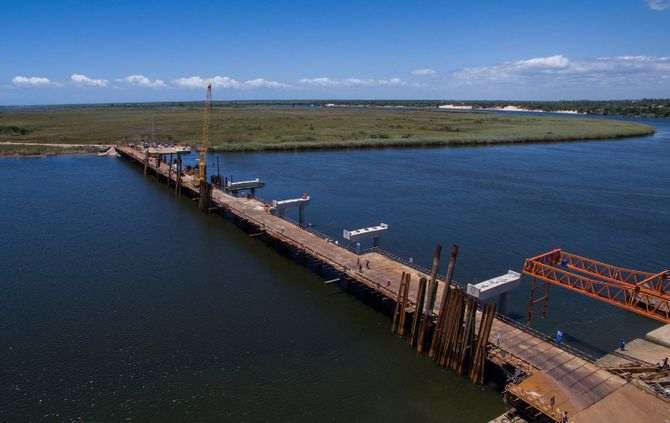ZimTrade Outward Trade Mission to Beira brings 15 export firms to Mozambique
Construction of Marracuene – Macaneta bridge almost completed

File photo / The Marracuene - Macacneta bridge, photographed earlier this year
The construction work for the bridge linking the town of Marracuene and the Macaneta peninsula, in the southern Mozambican province of Maputo, has entered its final phase and should be completed in September.
The work is being carried out by the Maputo-South Development Company (Maputo-Sul), which is also building the Maputo Ring Road.
According to the chairperson of Maputo-Sul, Silva Magaia, the 300 metres long and 11 metres wide bridge will facilitate the circulation of cars and people without interruption (currently the link between the two places is served by a ferry that has had reliability problems). He added that crossing the bridge will be much cheaper than the cost of the ferry.
Magaia was speaking on Friday during a visit to the construction site by the Minister of Public Works, Carlos Bonete. During the week, the Ministry of Public Works had been holding its coordinating council in Marracuene.
The Maputo Ring Road will cost a total of 315 million US dollars, with 95 per cent of the funds coming from a loan from the Chinese government. It will have five tollgates, one of which covers the Macaneta Bridge.
Carlos Bonete also visited the construction site where 160 apartments are being built at Zintava. The 365 million meticais (about 5.3 million dollars at current exchange rates) project is being implemented by the government’s Housing Promotion Fund (FFH). The aim of the project is to provide housing for public servants. Construction began this year and is expected to last 18 months. The flats will be made available through 15 and 20 year mortgages.
At the end of his visit, Bonete commented that the completion of the bridge will alleviate the current situation which is characterised by delays and uncertainty at the ferry crossing. He added that the building work at the apartments is proceeding at a good pace.
During the week, the coordinating council took stock of the ministry’s compliance so far with the government’s Economic and Social Plan (PES) for 2016. In particular, it looked at the process of decentralisation in the provision of water and road safety.
The coordinating council noted that among the main challenges facing the ministry are the devaluation of the metical, rising prices for construction materials, the severe drought hitting the south and centre of the country, and the political instability in the centre of the country.
The coordinating council highlighted the need to continue to mobilise funds and establish public-private partnerships for the construction of multiple use dams for water supply, irrigation and electricity generation; the upgrading of roads; and the promotion of house building.
The event was attended by senior staff from the ministry including national and provincial directors.













Leave a Reply
Be the First to Comment!
You must be logged in to post a comment.
You must be logged in to post a comment.